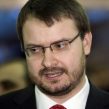
Belarusian Opposition Prepares for Local and Presidential Elections
Publication: Eurasia Daily Monitor Volume: 7 Issue: 23
By:

On January 28, Ales Mikhalevich, the former Deputy Chairman of the Belarusian Popular Front, announced that he will run for the Belarusian presidency in the election anticipated next year (Belapan, January 28). He is the second oppositionist anticipated to participate, as Alyaksandr Milinkevich, the leader of the Movement for Freedom, announced last November that he would likely run for the second time (Belapan, November 15). Mikhalevich’s announcement reflects the diverse positions of the Belarusian opposition, which to date have failed to undermine the influence and authority of President Alyaksandr Lukshenka, despite a period of acute economic uncertainty.
Mikhalevich, a frequent target of the Lukashenka regime in the past, declared that he would be campaigning for the maintenance of identity and culture, and assembling a team of young Belarusian urban professionals, educated in the West. His campaign will be targeted not at moving the state eastward or westward, but promoting the interests of Belarus (Nasha Niva, January 27). Aged 34, he is a graduate in law from the Belarusian State University, and a former leader of the Belarusian Students’ Association. In 2003, he was elected as the Deputy Chairman of the Belarusian Popular Front, but expelled five years later for attacking the party’s leadership openly in a newspaper interview (Belapan, January 28; European Radio for Belarus, June 14, 2008).
As political activity in the country is oriented toward the local elections scheduled for April 25, the Belarusian opposition, as Mikhalevich’s announcement symbolizes, remains divided. On October 27, 2009, the formation of a Belarusian Independent Bloc (BIB) was announced, consisting of a coalition of opposition political parties and associations, including the Movement for Freedom, the Belarusian Popular Front, (unregistered) Belarusian Christian Democratic Party, Young Belarus, Youth Christian and Social Union, Right Alliance youth movement, Young Front, and Razam (Together). The goal was to put together a single list of democratic candidates for the local elections (www.milinkevich.org, January 23).
One month later, the BIB decided to withdraw from the United Democratic Forces (UDF), which was formed in 2005 and elected Milinkevich to run as a united candidate in the 2006 presidential elections (www.naviny.by, January 26). Now operating on a system of rotating chairmen, the UDF is politically to the left and less oriented toward Europe than the organizations involved in the BIB, as it includes the former Party of Communists of Belarus under Syarhey Kalyakin, renamed Spravedlivyi Mir (Just World) last October, as well as the Social Democrats and the United Civic Party. On January 25, Milinkevich’s Movement for Freedom (MFF), which was officially registered last year, sent a facsimile letter to the co-chairman of the UDF, Anatol Lyabedzka, informing the latter that the movement was leaving the umbrella organization. Among the reasons cited for its departure was that both the MFF and the Popular Front consider that the UDF no longer exists as a formal entity (www.naviny.by, January 26).
The sentiments expressed in the letter were already well known. A meeting of the political council of the UDF was held in Minsk on the previous day, during which 28 attendees and Kalyakin stated that there was no feasible alternative to the UDF and that those seeking to undermine it were acting in an “irresponsible” fashion (European Radio for Belarus, January 25). A prominent member of the Popular Front, Vintsuk Vyachorka, remains a member of the UDF’s political council (www.naviny.by, January 26). Nevertheless, the BIB plans to enter 586 candidates in the local elections, with a final list anticipated by February 10 (ERB, January 23).
The first stage in the elections witnessed the nomination of members of the territorial election commissions, which had to be formed by January 30. But although political parties could nominate candidates, only 149 names were put forward out of 13,106 nominations overall (mostly gathered by votes of citizens, NGO’s, and workers collectives). Of the 149, only 49, or one-third, were members of opposition parties. By contrast, pro-government organizations such as the Belarusian Union of Youth, Belaya Rus’ and the Public Association of War Veterans jointly nominated over 1,300 members (Belapan, January 28). The inference is clear: partly as a result of apathy (Lyabedzka’s description) the opposition will constitute only a tiny fraction of the commissions.
The latest poll findings by the Independent Institute for Social Economic and Political Research (IISEPS) indicated that in an “instant” election, 42.5 percent of those polled would vote for Lukashenka, 4.3 percent for Milinkevich, and 2.4 percent for Alyaksandr Kazulin, the other opposition candidate in 2006. Other survey questions indicated that the respondents believe economic conditions have deteriorated and a majority holds the government responsible (https://www.iiseps.org/press11.html). Thus to date, the various maneuvers by the opposition and the economic woes of the regime have had little impact on public opinion.
If, as expected, the UDF eventually chooses its own candidate to run for the presidency, Lukashenka will face at least three opposition leaders (including Milinkevich and Mikhalevich), as opposed to two in 2006. Even under more democratic conditions promised by the central election commission, that considerably reduces the chances of any of them reaching a second round. Conceivably, the BIB may eventually replace the UDF as the leading force of the opposition, relying particularly on the support and activism of its youth sector. However, it will have to broaden its appeal to the electorate in the year ahead.




